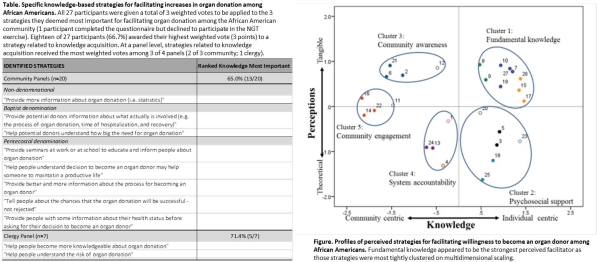Identification of Strategies to Facilitate Organ Donation Among African Americans
J. Locke,1 H. Qu,2 R. Shewchuk,2 D. Segev,3 M. Martin.4
1Surgery/Transplantation, University of Alabama at Birmingham, Birmingham, AL
2Health Services Administration, University of Alabama at Birmingham, Birmingham, AL
3Epidemiology, Johns Hopkins University, Baltimore, MD
4Medicine/Preventive Medicine, University of Alabama at Birmingham, Birmingham, AL.
Meeting: 2015 American Transplant Congress
Abstract number: D55
Keywords: African-American, Donation, Psychosocial
Session Information
Session Name: Poster Session D: Disparities in Healthcare Outcomes
Session Type: Poster Session
Date: Tuesday, May 5, 2015
Session Time: 5:30pm-6:30pm
 Presentation Time: 5:30pm-6:30pm
Presentation Time: 5:30pm-6:30pm
Location: Exhibit Hall E
Background: African Americans (AA) are disproportionately affected by renal disease, yet few receive a kidney transplant. Surveys assessing attitude toward donation have demonstrated that AAs are less likely to express a willingness to donate their own organs compared to Caucasian Americans. Studies aimed at understanding factors that facilitate AAs' willingness to become organ donors are needed.
Methods: To elicit perceived strategies, we conducted four nominal group technique (NGT) meetings (n=28 AA). Participants independently identified the three most useful strategies, generating an array of 27 non-redundant facilitative strategies. A card sorting task was then completed (n=90 AA), and strategies were sorted into piles based on similarities. Multidimensional scaling and hierarchical cluster analysis were performed. Participants completed an organ donation questionnaire.
Results: Among participants, 27% disagreed with deceased donation; 49% disagreed with living donation. 66.7% of NGT participants identified knowledge acquisition as most important in facilitating willingness to become an organ donor. Collated NGT strategies to improve knowledge included seminars and provision of statistics and donation-related risks [table]. Card sort participants then identified five distinct clusters: fundamental knowledge (strongest facilitator with tight clustering), psychosocial support, community awareness and engagement, and system accountability. 
Conclusions: Approximately one-third of AA participants disagreed with organ donation, and almost half disagreed with living kidney donation specifically. Our results suggest that improving knowledge about organ donation, particularly with regard to need, long-term outcomes, and donation-related risks, may facilitate increases in organ donation among AAs, particularly living donation.
To cite this abstract in AMA style:
Locke J, Qu H, Shewchuk R, Segev D, Martin M. Identification of Strategies to Facilitate Organ Donation Among African Americans [abstract]. Am J Transplant. 2015; 15 (suppl 3). https://atcmeetingabstracts.com/abstract/identification-of-strategies-to-facilitate-organ-donation-among-african-americans/. Accessed July 13, 2025.« Back to 2015 American Transplant Congress
